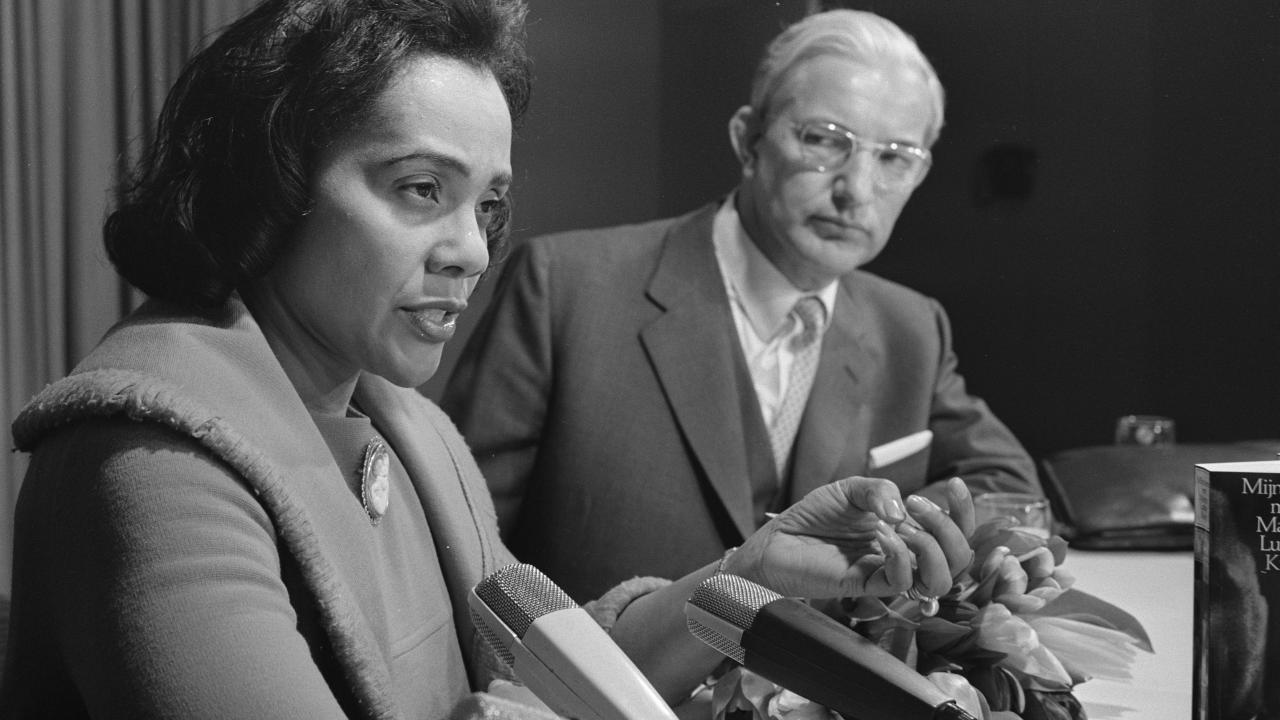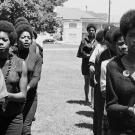
Historian Foregrounds Coretta Scott King’s Life and Role in Black Civil Rights
When Coretta Scott first met Martin Luther King, Jr., she didn’t think much of him. He was short, first of all. Second, he was a reverend and a reverend’s son at a time she doubted her own religious beliefs.
On their first date he asked her to marry him. When she said, "no," he asked for another date. "Maybe," she said.
The story of Coretta Scott King's and Martin Luther King, Jr.’s first meeting is well-known. As she writes a new biography of Scott King, historian Traci Parker is learning just how much she contributed to her husband’s ideas and actions, and how his story is also very much her own.
“I think most people like to characterize Coretta as sort of the helpmate of King,” said Parker, an associate professor of history at the College of Letters and Science at UC Davis. “I think she doesn't get enough credit for being a guiding force because women in the Civil Rights Movement are deemed invisible in many ways.”
Married in a blue dress
Scott King had been in love before she met her husband. She was a singer and had studied music at the New England Conservatory in Boston. When she began to perform on tour, she began to date a white Jewish musician who was her piano accompanist. Their relationship ended when she decided she could not live with the realities of racism she experienced as they traveled together on tour.
It was in Boston that she met her future husband while he was finishing his Ph.D. at Boston University. It was raining when he picked her up for their first date. At the restaurant they talked about imperialism and capitalism. They talked about racism. By the end of the evening, he told her she had all the qualities he wanted in a wife.
She was reluctant to get married. It would mean giving up her individuality.

“It's very clear that she understands that in the post-war era, marriage is supposed to mean a contract that leaves a woman in second class citizenship,” said Parker.
In the 1950s, when every woman who got married took her husband’s name, Scott King kept her own. Instead of a church, they were married in a field. She wore a blue dress and removed the word “obey” from the vows. Back in Boston, it was her husband who cooked and did the laundry.
“She constructed a union that recognized her own individualism and one in which she's not tethered to her husband,” said Parker.
Being a source of strength
When Scott King married her husband, she committed to a partnership that would last until his death. It was a true partnership in every sense.
Parker said that part of why Scott King’s role in the Civil Rights Movement has been so overshadowed by her husband’s is that patriarchy was very prevalent even in this struggle for liberation. King’s organization, the Southern Christian Leadership Conference (SCLC), was led by men who had a strong sense of what men’s and women’s roles should be.
In fact, Scott King was more radical politically than her husband. She was involved with the Progressive Party before he was. She also believed in the ideology behind the poor people’s campaign before he did. She was the first to take a stance against the war in Vietnam.
They argued when she felt constrained by a married life that kept her from the activism and music that had been central to who she was when they first met. He once demanded, “Am I not enough for you?”
Her response: “This is not about you. This is about me feeling fulfilled.”
She went on the road without him to perform in concerts that would raise money for the Civil Rights Movement that had become central to their life together.
In the worst of times, Scott King was a source of strength. Soon after the Montgomery Bus Boycott in 1955, their house was bombed. They had just had their first child. King, Jr.'s father, who everyone called “Daddy King,” insisted they had to leave Montgomery immediately.
Throughout his life, King, Jr. seldom challenged his father. Scott King would stand up to Daddy King when no one else would. It was she who insisted they stay.
Personal attacks to undermine a movement
In 1964, at the age of 35, Martin Luther King Jr. was awarded the Nobel Peace Prize. When they returned home from the ceremony, she unbundled the mail to find an anonymous package addressed to her husband with a letter and tape recording.
The recording purported to capture her husband taking part in an orgy in a Washington D.C. hotel. The letter threatened to leak the tape and undermine both his personal reputation and the Civil Rights Movement itself if he didn’t commit suicide.
It would become widely known that the tape and letter were sent by the Federal Bureau of Investigation, but when Scott King first opened the package, she didn’t know who it was from. She had heard rumors about her husband’s infidelity, but when she listened to that tape she said, “I don't hear my husband.”
“There's a sense that she knows about whatever affairs might have been going on, and they still operate as a partnership,” said Parker.
Scott King also knew that this tactic of using wiretaps and blackmail to attack Civil Rights Movement leaders was common. The U.S. government used one of these “poison pen” letters on Ralph Abernathy, one of King’s close friends and mentors.
“I'm less concerned about whether the infidelity is true and more concerned about how the state becomes this interfering entity in Black people's lives to destroy a movement,” said Parker. “They make this transition from, ‘I'm interested in whether people are affiliated with the Communist Party,’ to wanting to find everything about their sex lives and their romantic lives.”
A story of resilience for these times
Parker began this project of writing Coretta Scott King’s story when she was on a panel discussion in Boston to celebrate the anniversary of the Civil Rights Act. With her was David Greenberg, who had just written a book on John Lewis, and Jonathan Eig, whose book on Martin Luther King, Jr., had just won the Pulitzer Prize. It was Eig who suggested she write the book on Scott King.
As Parker was going through interviews with her, she noticed that the questions asked of her were always about her husband. Even her autobiographies read like they are biographies of her husband merely narrated from her point of view.
Parker said that writing Scott King's story has been a way to look at those records differently. After her husband died, she became outspoken for LGBTQ+ rights. She got heavily involved in labor unions and in groups protecting the welfare and rights of Black women.
“She should be the main driving force in her own narrative. It's been a matter of asking different questions of those documents and trying to look at them in a different way.”
— Parker
Parker recently gave a talk about Scott King at an all-girls school in Maryland. The audience was mostly parents with a few of the students here and there. Parker talked about her resilience. She had lived under a type of surveillance and scrutiny that’s hard for us now to understand. Every day she was under the threat of harm and worry that her husband might not make it home.
And still she was adamant about living a life that would fulfill her. She wanted to be a part of a movement that helped people, and this never changed even after her husband’s death.
“She just has a resiliency that I think we can take lessons from,” said Parker. “She always came back to the idea of the kind of life that would fulfill her. She could say what she needs and what she wants and moved in that direction even knowing it's going to be the hardest thing ever. I think she's a perfect lesson for us now.”
YOU MAY ALSO LIKE THESE STORIES

Taking a Closer Look at Black History in the U.S.
Traci Parker, an associate professor of history, is working to fill out what we know about the Civil Rights and Black Power Movements in the U.S., and in the process is building deeper connections to the past.

Taking History from the Front Porch to the Streets
Greg Downs, professor and chair in the Department of History, writes about his experience as a 2023-24 Public Scholarship Faculty Fellows and his new community engaged work bringing under-told Black histories to light.
